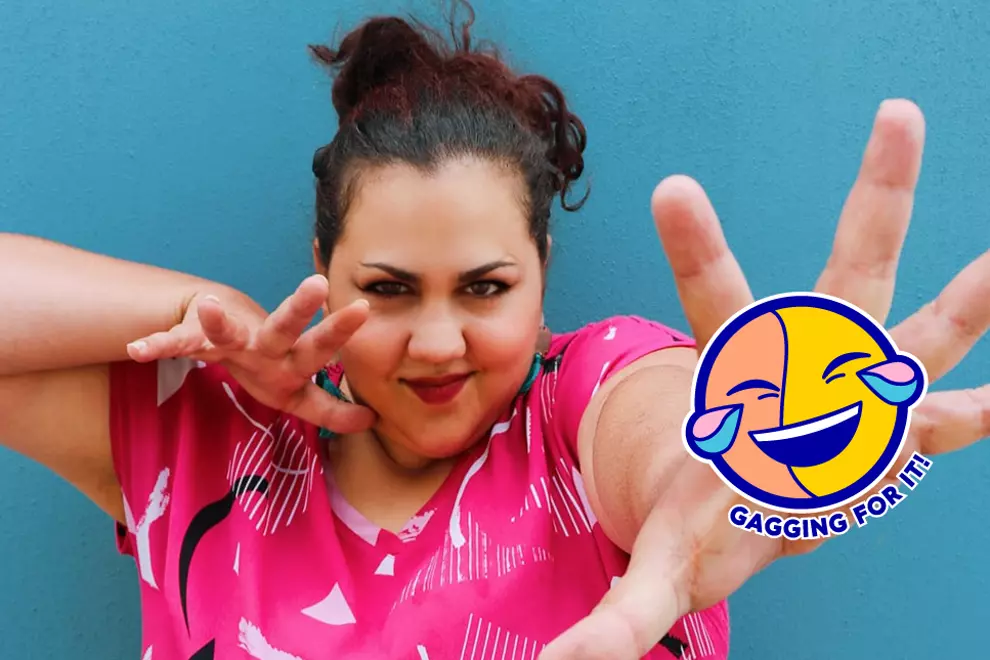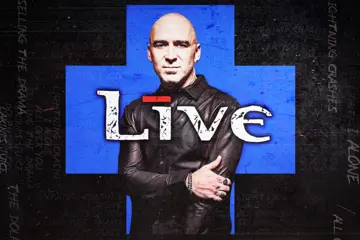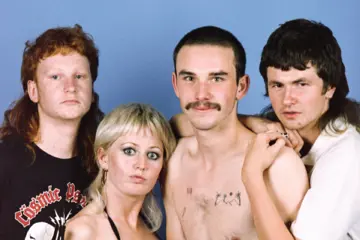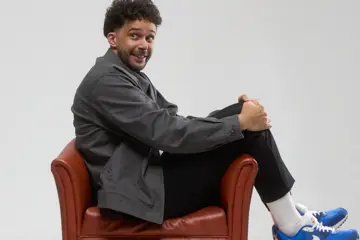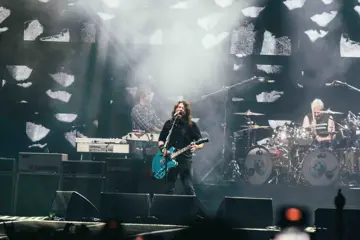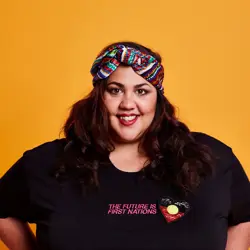 Steph Tisdell
Steph TisdellCONTENT WARNING: This article contains discussion of mental health. If you are suffering from any of the issues that have been discussed or need assistance, please contact Lifeline on 13 11 14 or Beyond Blue on 1300 22 4636.
Yidinji woman and comedian Steph Tisdell has a booming, infectious laugh. The Pinder Prize winner laughs easily and warmly, filling the space down the phone line when she chats to The Music ahead of her sold-out Sydney Comedy Festival shows, Identity Steft.
“I have always been known for laughing a lot,” she admits, recalling a childhood memory of laughing so much it hurt. Tisdell remembers wanting to talk to her teacher about something at lunchtime when she was in Grade Three. Except, like millions of kids before her, she slipped up, forgetting exactly whose attention she was trying to get.
“I spent ages and ages and ages yelling out and she just wouldn't answer, it really annoyed me, and then she finally comes over and goes, 'Are you yelling for me? Because you've been yelling out "Mum!" for the last five minutes.’
Don't miss a beat with our FREE daily newsletter
“I was just so embarrassed and mortified at this idea that a little kid was screaming, 'Mum! Mum!' without even realising. I think it was just the silliness of, oh yes, everyone's called their teachers mum in class, but just the idea of screaming through an office repeatedly for a long enough time that we were both uncomfortable about it.”
Is she sure she so quickly felt like laughing about it, rather than feeling ashamed? “I don't even really know. I remember laughing until I cried.”
“My brothers make me laugh more than anybody I reckon."
Tisdell links her finding that funny at a young age to something that still makes her laugh now – when you take a joke as far as it will go.
“There's like a rollercoaster thing that happens with jokes where if you take it one step too far it stops being funny, but if you have the guts to keep on pushing it past that, it gets a way better second wind.”
That inclination “to take things too far it’s stupid” is part of the sense of humour she shares with her brothers, which she describes as “silly and playful”: “My brothers make me laugh more than anybody I reckon.
“Sometimes we like to make each other laugh by really grossing each other out. So for example, and I don't know why, but me and my friends and brothers were laughing the other day about making up new tongue twisters that are really inappropriate. And we were going, 'Penelope's pink and peach pissy pus-y pussy.' Just to make each other uncomfortable.
“A big part of it is just knowing how to make each other uncomfortable and just being little shits about it.”
Even though Tisdell’s own brand of stand-up doesn’t veer to what she describes as “total silliness”, “I think my favourite is still just stupid shit.”
That silliness, that stupid shit, is a big part of how she and her family “laugh together and bond”, even if it requires extreme “commitment to a bit”.
“So for example, you know Super Grover? There was an episode of Sesame Street where Super Grover was on it, but when he announced himself he was like 'Supe Pergrover', and there was a really big gap between 'Supe' and 'Pergrover', and [now] me and my family, we all say, 'Supe', and then see how long we can go before saying 'Pergrover'. But one of my brothers hasn't said 'Pergrover' in I think nine years.
“We all just think it's so funny because we're like, 'Oh, is he gonna say it? Is he gonna say it?' He's like, 'I'm never gonna say it until my deathbed. The last thing I’ll ever say is 'Pergrover'. Just the commitment to a bit in my family is ridiculous.”
While “blackfellas are the funniest people I have ever known”, Tisdell notes that Aboriginal comics are underrepresented in the industry: “How the hell is it 2019 and there are maybe four or five working Aboriginal comedians in Australia?”
That need for representation is one thing that drives her as a comic.
“Apart from Ernie Dingo and Deborah Mailman, while I was growing up – it's happening a bit more so now – I just can't remember seeing Aboriginal people on TV. I don't remember knowing really that many Aboriginal people who were proud. I remember feeling not ashamed but fearful of my heritage, not fearful of my heritage like, 'Oh my God, it's gonna come and get me,' but fearful of identifying when I was in high school because of things that I'd hear people say.
“You know what would make a difference? If there was anybody to fucking look up to and ask questions of. Just anybody who represented me.”
It wasn’t until she was 17 and had left school – Tisdell went on to study law – that she learned to be “ok with being proud of who I am”.
“I always felt a little bit disconnected from my family, not my immediate family but my mob, because we lived in Brisbane, and my people are from Far North Queensland. I felt a little bit disconnected, but also had a huge amount of shame about the lack of knowledge that I had. I felt shame about the fact that I had felt fear in being proud of who I was, and then I got involved with this Deadly Funny stuff.”
"If you're not trying to make a difference what's the point?"
She got involved with MICF’s Deadly Funny competition and workshop program as a mentor, encouraging emerging Aboriginal comics, like last year’s winner Leon Filewood, to practice at open mics with her and to grow as stand-ups. She says getting involved with the initiative was the moment “everything changed": “Before that I really cared and I wanted to make a difference but I had nothing to really, really push me forward with that passion.”
Tisdell lands on the idea that she wants to “do comedy to sort of do Aboriginal advocacy”. That is what keeps her motivated as a comic.
“My whole thing would be – but I think that across the board – if you're not trying to make a difference what's the point? If there's nothing that drives you, how do you enjoy everyday life? That's just kind of more of a personal philosophy, just this idea of, 'I don't know what the fuck's going on, but I know that I feel better when I'm trying to help other people and I know that community is what I care about,' and the idea of being able to be in a position where you can encourage community in that weird sense – an audience is a community.
“I think you've gotta have that something that drives you forward because otherwise the lack of money and the stress and the sleeplessness and the not being able to switch your brain off and the relationships that fall apart as a result of travelling so much and being quite single-minded and selfish [of being a professional stand-up], that shit would get to you.”
She approaches comedy from a position of authenticity and vulnerability, seeing the act of making others laugh as “selfless” and generous, especially as most of the time she performs to non-Aboriginal people.
“I guess what's difficult in my position is that I'm not hugely representative of most of the audiences that see me. There is an audience that I am representative of and I'm trying to reach out to them – as in, Indigenous women – but most of the audiences that I'm in front of are middle-class white people. So I feel like it's really my duty to show them a different perspective and a perspective that is surprising to them – I think that's where the humour comes from in that there's an element of surprise, an element of interest in learning something new.”
"I could just laugh about shit and share stories about how crazy my mind was at that time."
Comedy has also helped Tisdell to overcome difficult things – she says laughter helps her live with her generalised anxiety disorder. A “massive breakdown in 2016” forced her to take a year off comedy, after she had spent years building a profile in the UK. But it was when she got back on stage that she felt she “started getting out of the funk”, adding credence to her belief that laughter “chang[es] the lens that you see things in”.
“It was because I could just laugh about shit and share stories about how crazy my mind was at that time. I got this fear of public transport. I developed something called pica as well, which is like a weird psychological eating disorder where you just want to eat non-foods. I still have it – I really like to eat sand and I don't know why. I like sand and stuff that's just got a crunch in my mouth; it's just about texture.
“I know it's part of a psychological disorder, but it's fucking hilarious. I make jokes about it now and it just makes me feel way better than sitting there going, 'Oh my God, there's something fucking wrong with me, I need to get my life in order.' It's like it's alright, it'll happen over time, I'm slowly getting more stable, but fuck, it's funny that my brain's way of dealing with difficult things was just to go, 'Fuck it, let's eat some rocks, let's eat some dirt.'”
Tisdell is embarrassed to explain the last thing that had her howling with laughter – even if it’s something you can watch on her Facebook page. She posted a Facebook Live video about it at the end of last month while she was at her boyfriend’s house. He didn’t share her amusement.
“I have no idea where it came from, I just started thinking about the fact that at one point all Sharons were babies. Can you imagine a baby Sharon? It just seems ridiculous. I feel like Sharon was only ever a name that was popular for like five years max [and] they're all English women with short hair who always speak to the managers and nobody will ever name their kid Sharon ever again.
“And like baby Dennis, baby Paul. Can you imagine a baby named Paul? I just fucking lost it… I was crying with laughter. I went live and then I don't know people were like, 'Baby Trish,' that one killed me as well. So the last time I laughed so hard I was like crying and couldn't breathe was because I thought of baby Sharon. God, that's an embarrassing thing to tell you.”
Steph Tisdell is on tour now.

